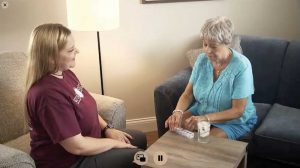By Angela Kauffman, Snyder Village
Having healthy, clear communication is a vital building block in any relationship, whether that be in a business setting or in our personal lives. Good communication does not always come easily and often requires focused effort. And if you are trying to communicate with someone who has Alzheimer’s disease or a related dementia, communication can become even more challenging. A change in the ability to communicate can lead to frustration, misunderstanding, and confusion. Learning about the changes affecting your loved one and adapting new listening and speaking strategies can help ease frustration and improve your communication.
Changes in Communication Skills
As dementia progresses, an individual will begin to have memory issues. They may have trouble finding the right word or lose their train of thought when trying to speak. The meanings of words or phrases may be forgotten, and they may have difficulty paying attention and staying focused during a long conversation. Other changes you may notice in your loved one include:
- Using familiar words repeatedly
- Substituting words
- Describing objects instead of calling them by name
- Mixing unrelated ideas or phrases
- Speaking less often
- Reverting to a native/first language
- Relying more on gestures than words
Communication Tips
Alzheimer’s and dementia affect every individual differently, so it’s important to not make assumptions on how a person can or cannot communicate. Listening well and learning about your loved one’s own ability will help guide you on how to best communicate with them. Below are a few tips you can apply to make communication easier.
Be Patient—Speaking with your loved one will take more time than it used to. Give space for them to respond and allow extra time to listen without interruption. If they repeat themselves, respond with patience. Speak slowly and clearly.
Keep it Simple—Speak with short sentences. As the disease progresses, try to only ask questions that require a simple ‘yes’ or ‘no’ answer and ask only one question at a time. If asking an individual to complete a task, break the instruction down into simple steps they can follow.
Stay Respectful—Don’t exclude your loved one from conversation just because they have a diagnosis, and avoid talking about them as if they were not present. Encourage two-way conversations with them for as long as they are able, and be open to their concerns, even if they have a hard time communicating them.
Reduce Distractions—When possible, limit background noise and visual distractions, like those from a television, when trying to speak with your loved one. Creating a calm and quiet environment will help them hear and concentrate on what is being said.
Remain Connected—Giving an individual your undivided attention will encourage them to communicate with you. Hold their hand, call them by name, and make eye contact when engaging in conversation.
Avoid Arguing—It will not be beneficial to try and correct mistakes that your loved one may make. If they say something you don’t agree with, avoid arguing. Instead of criticizing or correcting, listen to their concerns to understand what they may be trying to communicate.
Use Nonverbals—As time goes on, your loved one may need to rely more on nonverbal communication. If they are having trouble coming up with a word, ask them to point to the object or gesture. Sometimes visual cues can help an individual understand what is being said. For example, showing them a glass while asking if they want a drink, instead of just asking the question verbally, can help get your point across.
Give Grace—Trying to converse with someone with Alzheimer’s or dementia, especially in the later stages, can be difficult. Give yourself and your loved one grace as you navigate the disease. If you find yourself frustrated, take a moment to take a break.
If communication gets too challenging, it’s okay if you don’t know what to say. Spending time with your loved one, giving a reassuring touch, or letting them listen to the comforting sound of your voice can mean so much. Your support, love, and friendship are more important than any words that may be spoken.
Memory Care at Snyder Village
Snyder Village, a life plan community in Metamora, IL, has two unique Memory Care programs for individuals facing Alzheimer’s or dementia. The staff know firsthand the challenges of communicating with individuals whose abilities have changed. Amanda Yetter, Activities Director at Snyder Village Health Center, stresses the importance of empathy when trying to communicate. “Remember that most people with dementia cannot do two things at once (i.e. eating and talking), and they can get overwhelmed very easily,” says Amanda.
“Each resident is unique,” explains Jessica Beyer, BSW, Memory Care Coordinator at Snyder Village. “Communication is imperative. Communication can be verbal and nonverbal, and it’s important to be patient, pick up on nonverbal cues, keep questions simple, don’t overwhelm or talk down, show respect, and try to comfort those with dementia. We want to ensure that each resident is treated with dignity, respect, and that their individuality is recognized and celebrated!”
Snyder Village is located at 1200 East Partridge in Metamora, IL. If you wish to schedule a tour, please call us at (309) 367-4300 or visit us on the web at www.snydervillage.com.
For additional informative and inspirational articles visit 50 Plus News and Views Greater Peoria Area online issue today.










